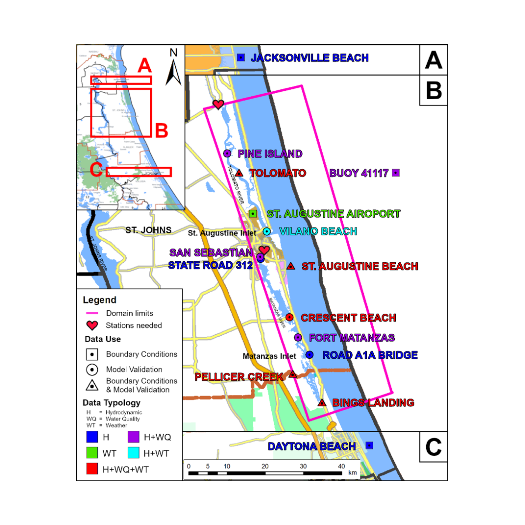 iCoast
iCoast

The University of Florida is launching a bold initiative to tackle some of Florida’s and human-kind’s biggest problems, through seed money generated to encourage researchers from all parts of the University to collaborate to answer specific challenges facing our state and nation. One of those “Moonshot” Initiatives is with UF’s Herbert Wertheim College of Engineering and the Whitney Laboratory for Marine Bioscience who are piloting a project that could serve as a model for collecting data on coastlines globally and Florida’s own 8,436 miles of coastline.
Using advanced sensors, including new technology in development at UF, a multidisciplinary team will collect data and develop a database never before available that provide a picture of the health of coastal infrastructure – bridges and piers – and biological systems, from mangroves to aquatic creatures.
Coastal impacts are significant for Florida since home values, tourism, fisheries and aquaculture can be affected by coastal impacts. This pilot and expansion will allow us to respond more preemptively to threats facing Florida’s well-being
The sensors will detect early signs of infrastructure failure, contaminant release, and environmental and physiological change, and the data generated will allow real-time management of threats to the natural and built environments of the coasts. The pilot will take place at the Whitney Laboratory for Marine Bioscience, a UF research and teaching facility, situated between the Atlantic Ocean and the Intracoastal Waterway on Florida’s east coast on the St. Johns and Flagler County border.
The team is addressing a global problem that impacts coastal areas around the world. In deploying the iCoast science-based network, UF will be able to develop the most complete understanding of a coastal ecosystem at multiple levels than any other place on Earth.
This will help Florida take action on real time mitigation strategies to coastal health threats, and serve as a model for national and international benchmarking.
This project serves to implement science in the connected world. iCoast brings together and connects research that otherwise has not been well coordinated to address threats facing our state and coastal regions nationally.

This monitoring network will sample environmental metrics from biogeochemistry to animal migratory patterns over the most diverse scales that have ever been attempted in any coastal ecosystem.
This effort is required in order to understand the complex interactions from molecules to animal behavior.
Data from this effort will be analyzed by interdisciplinary methods to determine the role of each ‘piece of the puzzle’ and provide opportunities for real time mitigation of environmental events such as hurricanes and harmful algal blooms.
Thanks to the hard work of local community members and scientists, northeast Florida is home to one of the most pristine coastal ecosystems left in the state. In addition, the existing infrastructure and expertise makes Whitney Lab for Marine Bioscience an ideal location to launch such an important monitoring system.
iCoast would further connect these strengths to help Florida build an ambitious example for other coastal states and nations to follow.
Step 1: The first step is establishing an advanced and nimble assessment and monitoring system that is coordinated among scientists and responders to this information. We are proposing to have denser monitoring expansion in the pilot location along the Matanzas River Basin and region.
Step 2: Network Predictive monitoring: With the data collection using advanced technologies developed by UF, computer scientists will develop network predictive modeling programs to join these data together.
Step 3: Develop a Forecasting system using predictive monitoring programming and create forecasting tools that can be used to make informed decisions.
Step 4: Pilot this at the Whitney Laboratory, but with additional support, expand to two other Florida monitoring locations.
Step 5: Expand to more sites in Florida as warranted.
The iCoast leverages the strengths across the University to tackle important issues facing coastal communities. The strengths of the high-tech skill set and location of the Whitney Laboratory, the protected marine research reserve situated within, and the depth and breadth of scientists and engineers working on these problems across UF make this an exciting project to impact Florida’s future.
Support to expand the network and deepen the monitoring system is currently being sought.